Interview with Audra Agen
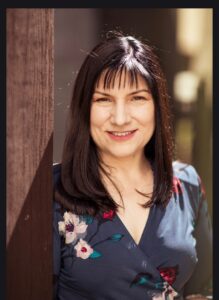 Audra Agen is a woman in the arena! She holds a high-power position in a high-stress industry and she does a podcast called Women in the Arena, celebrating “everyday women living extraordinary lives in plain sight.” I just hear that and my heart sings! Please join Audra and me as she takes us on her “leap of faith” journey. You will be inspired!!
Audra Agen is a woman in the arena! She holds a high-power position in a high-stress industry and she does a podcast called Women in the Arena, celebrating “everyday women living extraordinary lives in plain sight.” I just hear that and my heart sings! Please join Audra and me as she takes us on her “leap of faith” journey. You will be inspired!!
(I’ll be Audra’s guest on her podcast soon—I’ll keep you posted and send you the link! It was great fun!)
Diane: Welcome, Audra.
I’m so glad to speak with you today because I love your podcast Women in the Arena! I’m not sure if you call this your motto or your tagline but I love “the celebration of everyday women living extraordinary lives in plain sight.”
Audra: I think the best way to describe it is our focus—watching extraordinary women do remarkable things out loud in front of everybody. They’ve been doing it for so long, they make it look normal, but it is absolutely extraordinary.
Diane: I so love that.
Before we get into the how and why and the what of Women in the Arena, can you give us some background about yourself? I know you work in high power industry, a male dominated industry, but tell us how you got there.
Audra: I got there by accident.
As I think many people do.
I graduated from college 1994 and there weren’t as many options for women in business back in the early ’90s as there are now.
I happen to be in the mortgage industry. Anybody who has ever gone into the mortgage industry has always said, “I didn’t pick it. It picked me.” That is certainly the truth for me.
I was looking for something in a management, leadership type field. A financial institution said, “We are looking for new college graduates and we have a leadership training program,” and it happened to be for their mortgage side of the business. That’s how I fell into it.
“There’s Always Room for Reinvention”
In this mortgage industry, you are in one or two camps. You either love it or you hate it; it becomes either a part of you or you run away from it. I love it.
The reason I love it is because if you get bored, there’s always something else to learn. It is a small niche industry but it’s always evolving and there’s always room for reinvention.
That’s what I’ve done for 30 years—reinvent myself in this same industry. I have found myself bored many times and thought, “Well, what else can I do?” And I will dig around and go, “Oh, well, that’s something I could do. I’ll go learn that.”
Diane: Can you share the last time you got bored and how you came to what you’re doing now?
Audra: The last thing that I did was selling what is called fintech, financial technology, which for a long time the mortgage industry was resistant to embracing. When the market changed, it couldn’t get enough of technology. So I started to learn about technology and how it enhanced the industry as a whole, and I sold that.
And then I got to a saturation point and was like, “Eh, I’m done with that. I learned enough of that.” It all started to look the same. I got bored, so now I sell solutions, which is a completely different area, where you basically take all the pieces and make them work better together.
Diane: As a woman in a male dominated industry, how do you sell the idea and sell yourself to be in the position to do whatever it is you wanted to do next?
“It’s Never Been True That the Woman Next to Me Was My Competition”
Audra: You have to hustle.
Honestly, you have to outwork your colleagues. There is no other option.
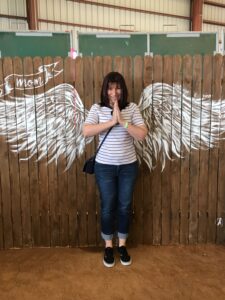 And you have to outperform them and do more than they do to show more value than what they can bring. It’s not a fair system, but that is the reality. At least, that’s been the reality for me.
And you have to outperform them and do more than they do to show more value than what they can bring. It’s not a fair system, but that is the reality. At least, that’s been the reality for me.
Diane: You’ve been doing this for a long time, I’m sure you have a certain reputation as someone who does a great job, which has probably made your ability to move easier.
What changes have you seen for women in general?
Audra: We’ve started to talk to each other more. Women are starting to collectively recognize what men have done naturally for decades, which is they have really networked really, really well with each other and helped each other out. Women inherited an idea of competition with each other. It’s never been true that the woman next to me was my competition. That’s been a lie and rhetoric that we inherited.
It came from this idea that the pie is small, which means there are only one or two spots, so you need to fight each other to the death to get that spot. That’s just not true.
The truth is that there’s room for everybody who wants a spot. All you have to do is make enough room for everybody who wants to be there to join. Not everybody wants to be there, and that’s okay. But there is room enough for everybody who does.
I think that we’ve also started to recognize the value within each other. We network and take care of each other.
And a lot of our male colleagues are starting to champion us as well.
“The ‘I Don’t Give an F’ Button Finally Ignites. That’s the Big Gift of Turning 50”
Diane: That’s wonderful.
And actually, that answer surprised. I was expecting, “Oh, we finally, as women, have proven ourselves. Men are now accepting us.”
And what you’re saying is that women have progressed mostly because we have started to value each other. That validation doesn’t start from the outside. Once champion ourselves and each other, then the broader world steps up. Right?
Audra: That’s correct.
At least from what I’ve seen in my own microcosm, we’ve started to acknowledge and recognize our own value and our own worth, and then the rest of the world starts to fall in line.
Diane: As you said, we’ve inherited this view that we’re competition. I think a lot of women have also inherited that they’re not as worthy. When we say, and believe, “Hey, that’s all BS,” the world starts to believe it too.
Audra: That is true.
That is the big unwinding. That is the beauty of turning 50.
Diane: Tell me more.
Audra: The “I don’t give an F” button finally ignites. That’s the big gift of turning 50.
I finally stopped caring what other people think. I honestly do not care what other people think of me. And that is such a freeing thought.
It’s only taken 53 years to get there.
And it’s also a daily choice, a daily practice, because there are all kinds of things that fight against me. Society fights against me, difficult upbringing fights against me, just regular feedback fights against me.
Go into any department store, walk down any cosmetic aisle, and there is feedback that tells me that there’s something wrong with me.
So I have to choose every single day that there is nothing wrong with me. Some days, it’s easier than others.
“I Ended Up Falling into This Crazy Weird Industry That I Fell in Love With”
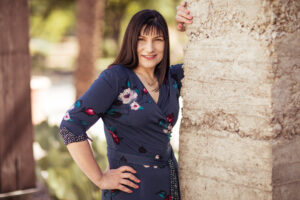 Diane: I love that you call it a practice. And I love the idea of making it so. So much of this is unconscious but once we’re aware of it, we can put the brakes on the Lancôme ladies—on the whole beauty industry that’s telling us we need something for our necks.
Diane: I love that you call it a practice. And I love the idea of making it so. So much of this is unconscious but once we’re aware of it, we can put the brakes on the Lancôme ladies—on the whole beauty industry that’s telling us we need something for our necks.
I love the “I don’t give an F” button. The reality is no one can control what somebody else thinks anyway. As long as you go into the world every day being authentic and honest about who you are and what you want to do and how you want to walk in the world, I think that’s all we can do.
You mentioned upbringing. I wonder how a young woman in the 1990s goes to college and decides she wants to go into business.
Audra: That also was not necessarily a choice.
I went to University of Arizona and wanted to study medicine. Back then, when you entered university, they didn’t make you choose a major right away. They were just like, “Do what you want to do for your first two years, kid. Knock yourself out. Come back to me your junior year.” I really wanted to study medicine, so I had taken a bunch of science classes.
By my junior year, my major ended up being, believe it or not, Spanish.
And my minor was chemistry because I had taken so many science classes that I had already earned that minor.
By the time I graduated, I was so overwhelmed with studying because I took all these extra classes to go to med school, I was tired. I thought, “I’ll just take a break. I’ll just take a break for a year, get a job, reset my brain, and then go to med school.” And then I ended up falling into this crazy weird industry that I fell in love with.
“I Cannot Have My Value Dismissed Anymore Just Because It Doesn’t Look the Same as My Male Colleagues”
Diane: Sometimes, accidents are the best, right?
We make these plans and choices, but they preclude other things. Our antennae are not even picking up other signals, and then boom, something falls in your lap that you never would’ve imagined and it’s the best thing.
Audra: Yeah. I never would’ve imagined.
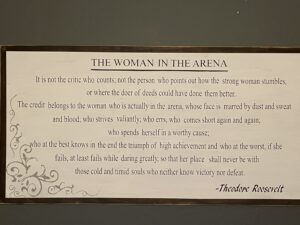 After I graduated, I got married. I’ve traveled all over the place in this crazy industry, met some amazing people. I may not have had this rich experience had I gone into medicine, because I would’ve been stuck in a classroom and stuck in a hospital for the next 10 years before I would’ve had a life.
After I graduated, I got married. I’ve traveled all over the place in this crazy industry, met some amazing people. I may not have had this rich experience had I gone into medicine, because I would’ve been stuck in a classroom and stuck in a hospital for the next 10 years before I would’ve had a life.
Diane: But knowing you the little that I do, you would’ve had a different rich experience—you would’ve made it rich.
Let’s talk about the podcast. First of all, I love the arena thing. I know Brené Brown speaks about it, but it comes originally from Teddy Roosevelt.
Audra: There’s an interesting story about how I named this podcast. There’s a giant plaque that’s hanging behind me. I watched the Brené Brown special on Netflix years ago and as soon as I heard the quote, I called an artist friend of mine and said, “I need you to do this plaque for me. I’m going to hang it in my office, but I need you to fix the pronouns because he got it half right.”
She did that for me, and I hung it in my office long before I ever had a spark of an idea of doing a podcast.
And then December 2019 came around. You have those moments where you’re just like, “I’ve had enough. I cannot have my value dismissed anymore just because it doesn’t look the same as my male colleagues, or it doesn’t look like other people think it should look. I have to do something.”
“We Weren’t Sharing How Extraordinary We Were Because We Didn’t Think We Were”
I was angry and raging, and I thought, “Okay, it can’t just be me.”
I looked around and realized I was surrounded by these amazing, brilliant, extraordinary women that were also being treated the same way, but we were all silent about it. We weren’t sharing our stories. We weren’t sharing how extraordinary we were because we didn’t think we were. And I thought, “Well, I have to find a community. There’s got to be one where we can all connect and talk to each other and ask each other questions and collaborate on something.”
I went digging. Couldn’t find one. So I thought, “I’ll make one.”
I announced to my family, “I’m going to do a podcast.” Why I thought a podcast, I had no idea, but I was compelled to do one. They didn’t think I was insane. My husband just asked me one question: “Do you know how to do a podcast?” And I said, “No. How hard could it be?”
I’m one of those people that literally doesn’t stop to think about how hard something could be until I’m actually in the middle of doing that thing and realize, “Oh my God, this is really hard.” But I’m in the middle of it. I’m like well halfway through it. I might as well-”
Diane: You can’t go back, right?
Audra: Can’t go back. I might as well just keep going. Finish it.
My son, who was 23 at the time, says, “Give me an hour, mom.” Runs up to his room, does whatever the millennial magic they do on their computer, and comes down and he’s like, “I got it. I figured it out.” Then he took me to Best Buy and he and I bought my first microphone, and he taught me the basics of how to podcast.
“I Didn’t Know Even What to Dream It Would Be. I Just Put It Out There”
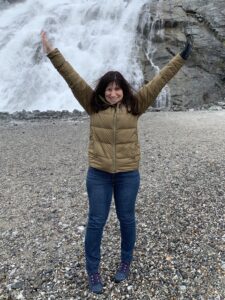 That was four years ago and since then, I’ve gotten much better at it because I’ve figured out who the gurus are, and I’ve figured out better techniques and that kind of thing. But four years ago, my son taught me how to podcast.
That was four years ago and since then, I’ve gotten much better at it because I’ve figured out who the gurus are, and I’ve figured out better techniques and that kind of thing. But four years ago, my son taught me how to podcast.
Diane: I think every house needs a millennial if for no other reason.
Audra: Yeah. Tech support.
Diane: How did you come up with this wonderful focus?
Audra: It’s what I needed.
Diane: I love that.
Audra: It was exactly what I needed. I had no idea if anybody would listen. No clue. I thought, “Well, I’ll put it out in the world and I’ll see what happens. And if it’s just a few friends that listen, then great. At least I’ve done what I’m getting pulled to do, and at least I can say I tried. And if I never get another guest again, at least I did it.”
Diane: That’s a terrific attitude. You do what you need to do—and at the risk of sounding all new-agey—without attachment to the outcome.
Audra: Yeah. I had no idea where it would go. I didn’t know even what to dream it would be. I just put it out there.
Diane: Do you consider yourself brave for doing that?
Audra: Depends on the day.
The information that I put out there is very raw and vulnerable because what I ask of my guests is to come authentically themselves, vulnerably themselves. Otherwise, it doesn’t work. There are lots and lots of podcasts that are very overly produced. And you can tell.
“On Some Episodes I Felt Very Brave Because They Were Very Raw and Very Real and Very Emotionally Naked”
I didn’t want that. I wanted people to feel their truth and wanted them to know that there were people out there that felt like they did.
If I’m going to ask that of my guests, I have to do that too. It’s very scary.
On some episodes I felt very brave because they were very raw and very real and very emotionally naked. And then there are other episodes that are just fun where we get to laugh a lot and just really enjoy each other. It’s a nice mix of both.
Diane: I really enjoyed being your guest. It was a lot of fun. I don’t even remember how emotional it was, but…
Audra: It was a little bit of both, and that’s great. It’s a reflection of life where there’s happiness, joy, laughter and some sad and some pain. We had a great mix of all of it.
Diane: Well, thank you.
Being vulnerable can be very scary, but doesn’t it get easier when you do it and you feel, “Oh, I’m still alive?”
Audra: Does it get easier? No, it doesn’t.
That doesn’t stop me from doing it. But absolutely not. It does not get easier.
There are episodes that I know when I produce them that I’m like, “Oh, yeah, I know exactly how I am on this one, and I’m not looking forward to putting this out there, but I’m going to do it anyway because I’m really vulnerable in this one.”
Diane: Can you share an example of where you felt that not only was your guest but you were as well?
Audra: Yeah. There was an episode where a woman talked about her abusive childhood, and it triggered me because I also had an abusive childhood.
As a matter of fact, I had to stop the interview because it brought up a lot of emotions that I wasn’t prepared for. I said, “Can we stop today? I was not prepared for what I’m feeling.” We rescheduled and did it again.
“I Just Had to Remind Myself That I’m an Adult Now. None of That Is My Reality Anymore”
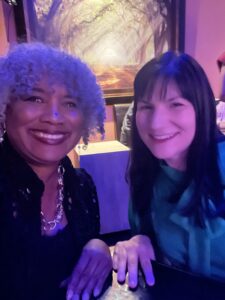 Diane: That’s very brave to acknowledge you were in over your head and needed to put the brakes on and prepare yourself in a different way.
Diane: That’s very brave to acknowledge you were in over your head and needed to put the brakes on and prepare yourself in a different way.
Audra: I knew that I needed to do it. It made me very anxious, which is exactly why I knew I needed to do it.
She was very accommodating.
We rescheduled, and it was a great interview.
Diane: What did you do for yourself before the second one?
Audra: Oh, I had a lot of self-talk.
I prepared emotionally, realized what I was walking into, and just had to remind myself that I’m an adult now. I’m an adult. None of that is my reality anymore. That hasn’t been my reality for a very long time, and that all my choices are mine now. They’re not out of my hands anymore. I had to just keep reaffirming that to myself over and over and over again so I could be calm.
Diane: Thank you for sharing that self-talk because sometimes, even when we want to encourage ourselves, we don’t know what to say. Can you repeat that? It bears repeating.
Audra:
I had to remind myself that my choices were mine. They weren’t mine previously because I was a child. But now I’m an adult and have free agency over what I do, what I feel, how I act, and the choices I make going forward, which also means my emotions. I can differentiate between a real threat and leftover emotions from what was a real threat as a child and no longer is.
Diane:
It’s very powerful.
Audra:
Today is real. Versus a memory.
Diane:
I think those few words are going to help a lot of people.
Audra:
That all comes down to choice and practice. Is this real? Those few words, “Is this real?” have changed my life.
Is this real?
Most of the time, it’s not. Most of the time, it’s in my head.
“I’ve Survived 100% of Everything That’s Been Put in Front of Me to Date”
Diane: This sounds very dramatic, but being vulnerable can feel like so high stakes, like life and death stakes. But once you do it, even in that example, you did it, it felt too much, you stopped, and then you said, “Okay, this is what I need to do to be vulnerable again on this topic.” And you are able to do it.
I would imagine that if the same conversation happens either on your podcast with another guest or in another conversation, you will have already done that so it won’t feel as scary.
Audra: I will be a little bit more prepared. I’ll be like, “Oh, yeah, I’ve been here before.”
Diane: And I’m not going to die.
Audra: Yeah, I’m not going to die. I remember this trigger. Okay, I’m going to take a deep breath. It’s fine. I survived. It’s okay.
I just have to remind myself I’ve survived 100% of everything that’s been put in front of me to date. It’s fine.
Diane: Do you also see that that is something that comes with being over 50? We’ve lived through some really hard things and we’re still here.
Audra: Yes. That definitely comes with having a little bit more mileage on the tires for sure.
Diane: Mileage on the tires! That’s great.
You said the podcast was something that you needed.
How has it filled the needs?
Audra: It has in a lot of ways that I didn’t expect.
It’s also opened up my eyes of now wanting more. In a lot of ways, it has changed my life in areas that I didn’t know needed changed.
As I explained before, this is a very vulnerable space. I’ve been doing it for four years. I’ve interviewed over 150 women.
Diane: Wow.
“They Give a Little Piece of Themselves to You as You Are Doing the Same with Them”
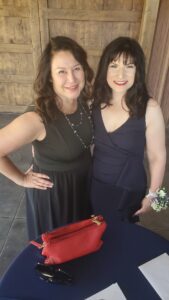 Audra: It is impossible to not be changed when you interview these women. There is an exchange of energy every single time you do an interview because they give a little piece of themselves to you as you are doing the same with them. You are forever changed by that. Forever.
Audra: It is impossible to not be changed when you interview these women. There is an exchange of energy every single time you do an interview because they give a little piece of themselves to you as you are doing the same with them. You are forever changed by that. Forever.
And they have opened my eyes to things that I never saw. I see the world in a very different way. I see the world in a more beautiful way and also more painful way because as your humanity grows, your empathy grows.
I’ve also grown in ways. I’ve become braver. I never knew I needed to be brave. I’ve stood up for people that I didn’t know that I needed to stand up for.
I’ll give you an example.
In my own little microcosm, I had a male leader that had a terrible habit of speaking over the women in a group. Once he started speaking over the women, women stopped speaking. You never heard from them ever.
I had an opportunity to speak to him privately, and I asked him to stop. He didn’t know that he was doing that. I said, “This is a problem because you never get to hear their ideas. You never get to hear my ideas. We never finish our thoughts. The only ideas and the only words you hear are the men on this team. You’re only hearing one side of the team, and the other side has significant ideas to contribute. You need to stop this.” And he did.
Diane: That’s so great.
Were you nervous to talk to him?
Audra: Hell yes. Oh my God.
I’ve never done that before. Ever.
Diane: He probably appreciated it.
“The Whole Process Has Been a Leap of Faith”
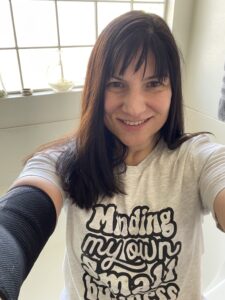 Audra: He did. And he recognized that the other male members on the team were also doing it and he stopped them from doing it.
Audra: He did. And he recognized that the other male members on the team were also doing it and he stopped them from doing it.
Diane: Oh, that’s so great.
I have the chills right now.
You didn’t know the outcome beforehand, right?
Audra: I had no idea.
Diane: That’s being vulnerable right there.
Audra: I just wanted other people’s voices heard, that’s all.
Diane: I love that example. I’m glad it worked out for you, and all the women, and everybody’s better off for it.
Audra: You know what? Even if it hadn’t, it was still the right thing to do.
Diane: You’ve grown, you’ve changed, you’re loving this, learning and everything else. I don’t think you’re at the bored spot yet.
Audra: No. No.
Diane: You may never be there, but you did mention something about the podcast showing you other things you need to do. Any other ideas brewing?
Audra: If there’s something more I need to do with this platform and what that more is I don’t know yet. It’s still developing. When it’s ready, it will reveal itself to me.
The whole process of this has been a leap of faith.
Diane: And that’s such an exciting place to be, to trust that whatever is needed will reveal itself to you.
Thank you for reading, everyone.
As always, I’d love to hear from you. Please write a comment or send me an email.
See you soon!
XOXOXO
Diane



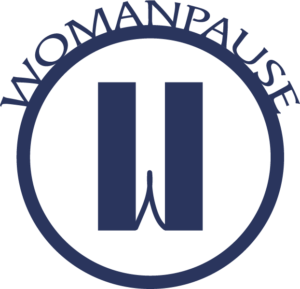
“But now I’m an adult and have free agency over what I do, what I feel, how I act, and the choices I make going forward, which also means my emotions. I can differentiate between a real threat and leftover emotions from what was a real threat as a child and no longer is.”
SO GOOD. This is how we do it. Thank you both for this great interview. I can’t get enough of these stories of amazing women finding ways to widen the path for all of us.
Sherry! I LOVED that part too–asked Audra to repeat it several times!! And thank you so much for your support! I am so grateful to all the women–including you, my dear–who have shared their wisdom with me!
Sherry-
Thank you so much for your kind words. It is my hope that when I can demonstrate my vulnerability, others can see that in themselves and acknowledge that as their greatest strength, rather than than weakness as we’ve been led to believe
Thank you for your kind words Sherry.
It is my hope that through my admission of vulnerability, that other women recognize their own and see it as their greatest strength, rather than weakness as we all have been led to believe
Wonderful wisdom in this interview! I will be checking out the podcast soon. Thank you, ladies!
Thanks so much, Char! And I learned so much from Audra’s wise words! You will LOVE the podcast!!
Thank you Charlotte!
I’m so glad you enjoyed it.
How interesting it is to learn from a woman in industry. Those of us born in the 1940s and 1950s could be secretaries but not leaders. Audra’s journey is both realistic and inspirational.
Thanks so much, Greta, for adding your perspective! How things change–thankfully! So wonderful to hear from you!
Greta-
My journey would not be possible without the brave women that put themselves out there first. They made a way so we could start kicking in the doors.